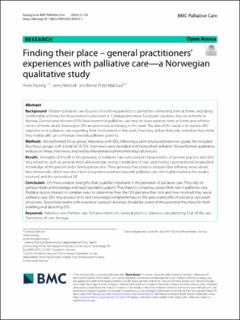| dc.contributor.author | Fasting, Anne | |
| dc.contributor.author | Hetlevik, Irene | |
| dc.contributor.author | Mjølstad, Bente Prytz | |
| dc.date.accessioned | 2023-02-21T13:03:23Z | |
| dc.date.available | 2023-02-21T13:03:23Z | |
| dc.date.created | 2022-10-04T12:39:14Z | |
| dc.date.issued | 2022 | |
| dc.identifier.citation | BMC Palliative Care. 2022, 21 (1), . | en_US |
| dc.identifier.issn | 1472-684X | |
| dc.identifier.uri | https://hdl.handle.net/11250/3052779 | |
| dc.description.abstract | Background
Modern palliative care focuses on enabling patients to spend their remaining time at home, and dying comfortably at home, for those patients who want it. Compared to many European countries, few die at home in Norway. General practitioners’ (GPs’) involvement in palliative care may increase patients’ time at home and achievements of home death. Norwegian GPs are perceived as missing in this work. The aim of this study is to explore GPs’ experiences in palliative care regarding their involvement in this work, how they define their role, and what they think they realistically can contribute towards palliative patients.
Methods
We performed focus group interviews with GPs, following a semi-structured interview guide. We included four focus groups with a total of 25 GPs. Interviews were recorded and transcribed verbatim. We performed qualitative analysis on these interviews, inspired by interpretative phenomenological analysis.
Results
Strengths of the GP in the provision of palliative care consisted of characteristics of general practice and skills they relied on, such as general medical knowledge, being coordinator of care, and having a personal and longitudinal knowledge of the patient and a family perspective. They generally had positive attitudes but differing views about their formal role, which was described along three positions towards palliative care: the highly involved, the weakly involved, and the uninvolved GP.
Conclusion
GPs have evident strengths that could be important in the provision of palliative care. They rely on general medical knowledge and need specialist support. They had no consensus about their role in palliative care. Multiple factors interact in complex ways to determine how the GPs perceive their role and how involved they are in palliative care. GPs may possess skills and knowledge complementary to the specialized skills of palliative care team physicians. Specialized teams with extensive outreach activities should be aware of the potential they have for both enabling and deskilling GPs. | en_US |
| dc.language.iso | eng | en_US |
| dc.publisher | BioMed Central | en_US |
| dc.rights | Navngivelse 4.0 Internasjonal | * |
| dc.rights.uri | http://creativecommons.org/licenses/by/4.0/deed.no | * |
| dc.title | Finding their place – general practitioners' experiences with palliative care—a Norwegian qualitative study | en_US |
| dc.title.alternative | Finding their place – general practitioners' experiences with palliative care—a Norwegian qualitative study | en_US |
| dc.type | Peer reviewed | en_US |
| dc.type | Journal article | en_US |
| dc.description.version | publishedVersion | en_US |
| dc.source.volume | 21 | en_US |
| dc.source.journal | BMC Palliative Care | en_US |
| dc.source.issue | 1 | en_US |
| dc.identifier.doi | 10.1186/s12904-022-01015-1 | |
| dc.identifier.cristin | 2058353 | |
| dc.source.articlenumber | 126 | en_US |
| cristin.ispublished | true | |
| cristin.fulltext | original | |
| cristin.qualitycode | 1 | |

